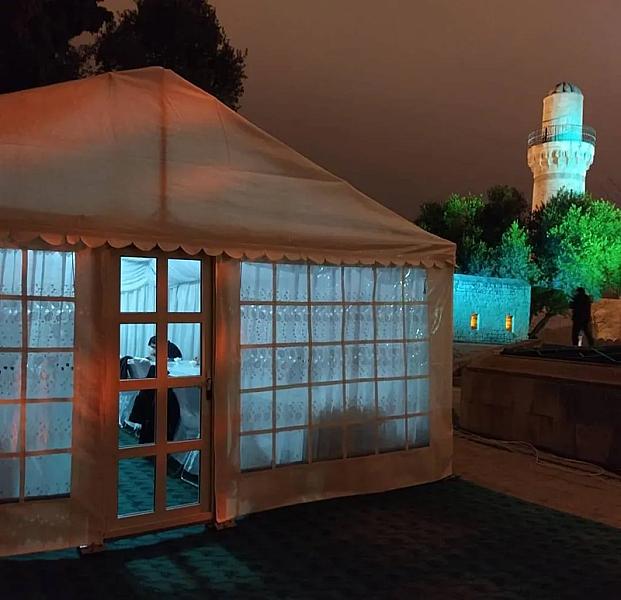Recently, news has been circulating about the removal of serving food during mourning ceremonies in various regions of Azerbaijan. The reports state that there has been a public-level agreement, primarily among religious people and elders, to simplify the charity meals at funerals.
The initiative to simplify charity meals at mourning ceremonies is not new. Similar initiatives have existed in previous years, and there have even been cases where food was confiscated by law enforcement agencies and taken to orphanages or military units. However, none of these attempts have eliminated the tradition of serving food at mourning ceremonies. The current initiatives also indicate this.
Can we believe that the recent efforts in some regions to simplify mourning ceremonies will bear fruit and that the tradition of serving food at mourning ceremonies in our country will disappear? In other words, will the current efforts succeed, or will they fail like previous attempts?

Speaking to Medianews.az on this topic, Aydın Xan Əbilov, the chairman of the New Writers and Artists Public Union, creator of the www.kitabxana.net – Mir Jalal Pashayev National Virtual-Electronic Library portal, presidential pensioner, writer and culturologist, said that he had made many calls regarding this issue in the past: “I have been strictly against the extravagant holding of mourning ceremonies both in social programs on TV channels and in expert reviews published on websites. As a result of our enlightenment efforts, the mourning ceremonies that used to last forty days have effectively turned into two days. That is, previously on the day of the funeral, and during the three and seven-day ceremonies, as well as on Thursday evenings and the fortieth day of the deceased, extravagant charity meals were served, tables were laid out, and food and sweets were offered; now these do not exist. In many cases, no food is served at all on the day of the funeral, and after the funeral, everyone disperses to their homes. In rural areas, charity is given on the second day only to guests coming from outside. Those working at the gathering also eat from this charity. Because they work at the ceremony all day, receiving the people who come to the gathering. Of course, they do not have the opportunity to go home to eat three times a day and then return. In urban areas, the three and seven-day ceremonies are combined. Sometimes Thursday evenings are also combined, and on one of the Thursday evenings – and that also not for the whole day but half a day – tea, halva, sweets, and sometimes rice pilaf are served, the Quran is recited, and the gathering concludes in half a day. In rural areas, gatherings are finished by midday. In principle, the previous extravagance no longer exists. That is the positive side of the issue.”
Let us also consider other aspects. Those who give extravagant charity are wealthy people, officials. The poor do not have the means to hold an extravagant mourning ceremony for their deceased. This is the second aspect of the issue.
Thirdly, I believe that such matters should not be overemphasized. We cannot completely erase all our people's customs and traditions. After all, mourning ceremonies for us are events of socialization, opportunities for people to see each other, share sorrows, help, and support each other.”
Emphasizing that mourning ceremonies, like wedding ceremonies, have historically been acts of compassion and mutual assistance in Azerbaijan, Aydın Xan Əbilov added: “I remember in our childhood, when there was mourning in the neighborhood, not only relatives and acquaintances of the bereaved family but also neighbors and other residents prepared food and brought it to the gathering. They also prepared the cleric’s meal. But as the situation improved and life became better, the mourning families began to organize these arrangements themselves. In many regions, money is given to the mourning, and the bereaved family is helped. This also causes the host to feel settled both materially, spiritually, and psychologically.
Now, if we eliminate mourning ceremonies, which are one of the social spaces, what will be the outcome? What are we trying to achieve with this? People don’t even leave social networks or the internet; they stay inside their homes, immobile, inactive. Now they don't attend weddings or celebrations like before either. If charity is completely banned, a tradition we call mourning ceremonies will end, and people may also turn their backs on mourning ceremonies. Then it will be difficult to gather people in one place and promote mercy and socialization as universal, national, and religious worldviews. Yes, the number of meals at mourning ceremonies can be reduced, the process simplified. But how can you tell a guest coming from afar, ‘Go eat at a restaurant and then come back to my gathering’? Or, ‘You’ve come, have some tea, then go eat at a restaurant, and then leave for home.’ People traveling from Baku to the regions or from the regions to Baku spend considerable money. If you don’t give them food at the ceremony, they will have to eat in a restaurant, which is like ‘putting one hand’s cap on the other hand’s head.’”
In his statement, the writer and culturologist also touched on other aspects of the issue: “Ceremony halls are owned by different individuals. Many interested parties (I do not know, maybe high-ranking officials or representatives of business structures) try to buy these ceremony halls from the owners and take control, that is, monopolize this business. We need to oppose this. The service sector is a somewhat developing field in Azerbaijan. There is almost no development in other sectors. Unemployment is increasing. Several people work in each ceremony hall – cooks, dishwashers, waiters... In addition, ceremony halls buy agricultural products and food from farmers, pay for electricity, gas, water, and taxes. So ceremony halls are workplaces and taxpayers. How is it that we forbid extravagant meals at mourning but do not oppose the extravagance in magnificent banquet halls owned by certain officials? Or why do we turn a blind eye to cafés serving Arabs in Baku, where half-naked women walk around all day and boys sell their bodies? But we rise against centuries-old traditions of mourning ceremonies and charity meals. Then let’s also oppose the charity meals given during Muharram and fasting periods. Are not many tables laid during fasting? According to Sharia law, charity during fasting should be given to the poor, but everyone feeds their charity to wealthy people from their own group. They invite people who do not need to show off to charity events. Let’s ban them too. Why have we only focused on mourning ceremonies? In fact, with this, we want to eliminate a ceremony that encompasses national and spiritual values.”
Opposing administrative interventions to stop food serving at mourning ceremonies, Aydın Xan Əbilov said that this also contradicts legislation: “The mourning family gives charity for their deceased, and no one has the authority to take the charity without their permission – even if it is given to an old people’s home or an orphanage. Only the donor of the charity can do this. Suppose part of the cooked food is distributed to children from poor families or nursing homes. Or a classroom in a school or a street can be repaired, trees planted. With this, one can promote that instead of food at mourning, people give charity in such ways. But charity should not be prohibited, nor should the donor be hindered. We can only discourage people from setting extravagant charity tables through intensified awareness-raising. Social criticism can exist. Administrative bans cannot. Overall, I am categorically against not serving any food at mourning ceremonies.”
Nailə Qasımova,
Medianews.az

